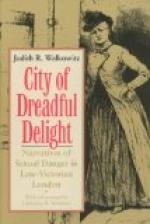“It is nothing,” the woman said, with a dreary patience. “It is as it was yesterday. I come here every day. I know.”
After a while Laodice looked about her. The entrance to their refuge was about the middle of the ruin and therefore a great many paces back from the streets, so that she did not see Jerusalem’s agonies face to face. But she saw enough to make her cold and to turn her shivering and panic-stricken into the darkness of the crypt below.
She saw the ascending streets of Zion and the tall fortifications mounting the heights within the city’s limits. There she saw the flash of swords, swung afar off, spears brandished and the running hither and thither of defenders on the wall. Below she saw the remote constricted passages between rows of desolate houses, moving with people, sounding with clamor. There she saw combats, terrible scenes of frenzy, deaths and unnamable horrors; starvelings gnawing their nails; shadows of infants pressed to hollow bosoms; old men too weak to walk that went on hands and knees; young men and young women in rags that failed to cover them, and wandering skeletons screaming, “Woe!”
Meanwhile huge stones mounted over the walls and fell within the city; three great towers planted beyond the walls, out of range of the Jewish engines and equipped with superior machines, were steadily devastating the entire quarter near which they were erected. Here two-thirds of the forces of Jerusalem were concentrated in a vain effort to resist the dire inroads of these effective engines. Here, the Maccabee and his Gibborim stood shoulder to shoulder with the Idumeans and fanatics of Simon and John, and here the half-mad defenders awakened at last to the fact that only divine interference could save the city against Rome.
In the south and the east conflagrations roared and crackled, where burning oil had been scattered over some remaining structures near the walls. When a great ram began its thunder somewhere near the Sheep Gate, there came a hollow booming noise of deafening volume from the charnel pits outside the walls and a black cloud of incredible depth soared up into the skies.
Laodice, dumb with horror, looked at the prodigy without understanding, but the woman at her side shuddered.
“God help us!” she exclaimed. “They are vultures!”
Laodice turned to rush back into the cavern and so faced the two men who stood behind her.
One, at sight of her, shrank with a gasp, and, averting his shaggy head till the long white locks covered his face, fled back into the crypt.
The other was gazing with unseeing eyes across groaning Jerusalem.
“I am the man,” he was saying aloud, but to himself, “that hath seen affliction by the rod of His wrath.”
The sight of him had a paralyzing effect upon Laodice. She saw, before her, Nathan, the Christian, who had buried her father, who had blessed her, who would know and could testify to a surety that she was the wife of Philadelphus!




